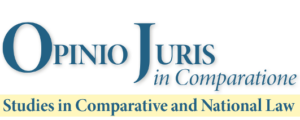Question of geo-legal perspective: geopolitical links as a potential driver of legal developments
Authors: Anna Marotta
ABSTRACT
The Geopolitical decisions and actions, alliances included, may influence legal developments. In current societies, the coexistence of different cultural groups in the same territory sometimes generates an identity defensive attitude by minority groups, who refuse to adapt to the majority culture. These antagonisms may give rise to geopolitical conflicts, namely rivalries for the power over a territory, which may cause legal changes. The events connected with the institutionalization process of Islamic Alternative Dispute Resolution in England, which has resulted in bodies generally called ‘sharia courts’, show that geopolitical dynamics impact on law, and vice versa. The use of geo-law as an exploratory methodological approach that combines Comparative Law and Geopolitics to address geopolitical conflicts arising from the circulation of legal rules, reveals that the functioning of sharia courts directs both the internal and external legal evolution, under the pressure of links between people with a common goal. At the domestic level, there are calls for legal changes. The required change concerns not only sharia courts, but also other phenomena linked to the application of sharia-based rules. At an external level, it seems that sharia courts are becoming a model of Islamic justice for Muslims in other countries, who resort to these structures to be trained as ‘judges’ and replicate that model in their own countries.
Through the geo-legal perspective, therefore, this paper aims to show the evolution of the relationship between the involved law systems and their founding values, turning the spotlight on human links as a potential driver of legal developments.
Keywords: Geo-law, ADR, English law, Islamic law, sharia courts

